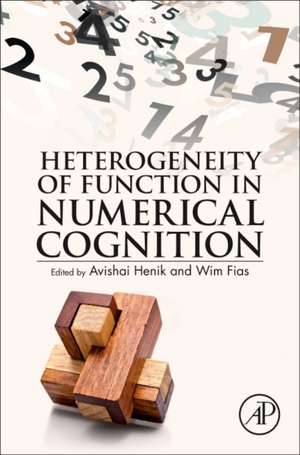Heterogeneity of Function in Numerical Cognition
Editat de Avishai Henik, Wim Fiasen Limba Engleză Hardback – 19 mai 2018
- Provides an innovative reference on the emerging field of numerical cognition and the branches that converge on this diverse cognitive domain
- Includes an overview of the multiple disciplines that comprise numerical cognition
- Focuses on factors that influence numerical cognition, such as language, executive attention, memory and spatial processing
- Features an innovative organization with each section providing a general overview, developmental research, and evidence from neurocognitive studies
Preț: 581.48 lei
Preț vechi: 739.29 lei
-21% Nou
Puncte Express: 872
Preț estimativ în valută:
111.26€ • 116.18$ • 91.88£
111.26€ • 116.18$ • 91.88£
Carte tipărită la comandă
Livrare economică 08-22 aprilie
Preluare comenzi: 021 569.72.76
Specificații
ISBN-13: 9780128115299
ISBN-10: 0128115297
Pagini: 480
Dimensiuni: 152 x 229 mm
Editura: ELSEVIER SCIENCE
ISBN-10: 0128115297
Pagini: 480
Dimensiuni: 152 x 229 mm
Editura: ELSEVIER SCIENCE
Public țintă
Neuroscientists, cognitive neuroscientists, neurophysiologists, neurologists, cognitive and developmental psychologists, graduate students, and post-doctoral fellows.Cuprins
Section I. Language
1. Numbers and language: What’s new in the past 25 years?
2. The interplay between learning arithmetic and learning to read: Insights from developmental cognitive neuroscience
3. Language and arithmetic: The potential role of phonological processing
4. Discussion: Specific contributions of language functions to numerical cognition
Section II. Performance Control and Selective Attention
5. An introduction to attention and its implications for numerical cognition
6. The control of selective attention and emerging mathematical cognition
7. Performance control in numerical cognition: Insights from strategic variations in arithmetic during the lifespan
8. The interplay between proficiency and executive control
Section III. Spatial Processing and Mental Imagery
9. How big is many? Development of spatial and numerical magnitude understanding
10. Is visuospatial reasoning related to early mathematical development? A critical review
11. Neurocognitive evidence for spatial contributions to numerical cognition
12. Which space for numbers?
Section IV. Executive Functions
13. Automatic interferences and their development in the context of numerical tasks
14. The role of executive function skills in the development of children’s mathematical competencies
15. Systems neuroscience of mathematical cognition and learning: basic organization and neural sources of heterogeneity in typical and atypical development
16. (How) are executive functions actually related to arithmetic abilities?
Section V. Memory
17. Numerical cognition and memory(ies)
18. Hypersensitivity-to-interference in memory as a possible cause of difficulty in arithmetic facts storing
19. Working memory for serial order and numerical cognition: What kind of association?
20. Don't forget memory ... to understand mathematical cognition
1. Numbers and language: What’s new in the past 25 years?
2. The interplay between learning arithmetic and learning to read: Insights from developmental cognitive neuroscience
3. Language and arithmetic: The potential role of phonological processing
4. Discussion: Specific contributions of language functions to numerical cognition
Section II. Performance Control and Selective Attention
5. An introduction to attention and its implications for numerical cognition
6. The control of selective attention and emerging mathematical cognition
7. Performance control in numerical cognition: Insights from strategic variations in arithmetic during the lifespan
8. The interplay between proficiency and executive control
Section III. Spatial Processing and Mental Imagery
9. How big is many? Development of spatial and numerical magnitude understanding
10. Is visuospatial reasoning related to early mathematical development? A critical review
11. Neurocognitive evidence for spatial contributions to numerical cognition
12. Which space for numbers?
Section IV. Executive Functions
13. Automatic interferences and their development in the context of numerical tasks
14. The role of executive function skills in the development of children’s mathematical competencies
15. Systems neuroscience of mathematical cognition and learning: basic organization and neural sources of heterogeneity in typical and atypical development
16. (How) are executive functions actually related to arithmetic abilities?
Section V. Memory
17. Numerical cognition and memory(ies)
18. Hypersensitivity-to-interference in memory as a possible cause of difficulty in arithmetic facts storing
19. Working memory for serial order and numerical cognition: What kind of association?
20. Don't forget memory ... to understand mathematical cognition
